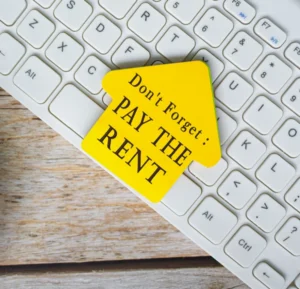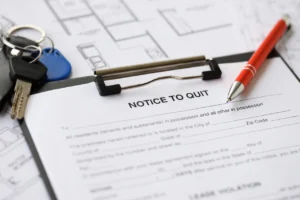Rent Increase Letter: Sample, Template and Guide in Writing

Rent increases are an unavoidable element of being a property owner. After all, you’d never be able to keep up with market value or inflation if you didn’t boost your rent. Maintaining your rental property would cost more than your income, and you’d struggle to continue to do business.
Fortunately, raising rent doesn’t have to be unpleasant or uncomfortable if you do it correctly. In fact, your tenants are likely to expect a slight increase in their rent from year to year.
However, many landlords find it difficult to ask their tenants for higher rent. While there’s nothing wrong with doing so, there is a specific process to follow. Providing a written notice in a timely fashion is the most crucial element of a rent increase. In addition, there are some items that should be included in every rent increase letter.
In this post, we’ll teach you when and how to raise your rent, as well as provide a sample rent increase letter to help draft your own rent increase notice.
What is a rent increase letter?
A rent increase letter is an official notice to an existing renter of a rent increase. These are usually granted 30-60 days before an existing lease expires.
A rent increase letter has two purposes:
- It clearly conveys the rent increase to the tenant.
- It serves as an official notice and proof of documentation.
It’s critical for all landlords to use a properly prepared rent increase notice. You must be confident that you’ve checked all the legal boxes for notifying and implementing a rental letter while safeguarding your reputation.
In most cases, if the lease is not on a month-to-month basis, the landlord will not be able to raise the rent. The conditions of standard one-year leases indicate that the rent will remain constant until the lease expires. Even if the lease is month-to-month, the landlord must check the conditions to ensure that rent increases are permitted.
How to calculate an annual rent increase
The general rule of thumb is that yearly rent increases should be between 3% and 5%. However, the amount you increase your rent will be determined by local and state legislation, the rental market and your own requirements. It may be in your best interest to increase rental prices in accordance with the local rental market — you’ll want to keep up with the competition without selling yourself short, but you also don’t want your rates to exceed other properties in the area.
Here are a few additional considerations that may influence how much you decide to raise your rent:
- Cost of living: You’ll probably have to modify your rent every year due to inflation. When determining rental costs, keep in mind that the cost of living in your city or region is typically reflected in earnings.
- Increases in property taxes: If your city raises property taxes, you may need to adjust your rent accordingly.
- Maintenance inflation: If maintenance costs rise, your first instinct may be to raise your rent. However, before you do so, you’ll want to explore whether there are ways to save on maintenance expenditures.
- Property improvements: If you’ve made significant changes to your property, you’ve almost certainly increased its market worth.
- Area improvement: When a new industry enters a neighborhood, rents rise. Take this into account when sending an increased rent letter.
What to include in a notice of rent increase letter
There are certain types of information that should be included in a rent increase notice. These details will assist you in clearly communicating the change to your tenants.
Include the following information in your notice of rent increase letter:
- Header
- Date
- A warm welcome
- Current rent
- The proposed rent increase
- The deadline for making a payment
- Date in which the rent increase will go into effect
- The due date for the tenant(s) to accept the rent increase
- Date the tenant(s) has to provide a non-renewal notice
- Signature of effect
- Signing date
Get a Rent Increase Notice Now
Part of AAOA’s State-Specific Premium Forms Package
AAOA’s rent increase letter template
Here is an increase of rent sample letter that you may use as a template:
{Name/Organization}
{Street Address}
{City, State, Zip}
{Contact number and email address}
{Date}
{Name(s) of Tenant(s)}
{Street Address of Tenant}
{City, State, Zip}
Dear {Tenant’s Name},
Thank you for entrusting us with your valuable tenancy. This Notice is to advise you that the [$ monthly rent amount] monthly rent for the unit you now inhabit, [Unit Number] at [Property Address], will rise to [$ New Monthly Rent] per month commencing on [Date of Rent Increase]. [Rent due date] is the due date for this rental payment and all future payments of [$ New Monthly Rent] should be made on the [day of the month due].
This notice will be sent to you [X days] before your next rental payment is due. If you want to keep your tenancy, you must make a new monthly rental payment of [$ New Monthly Rent]. Please be reminded that your [lease date] rental agreement’s other provisions remain in force [OR, if applicable, make adjustments to the security deposit].
Please sign below to indicate your acceptance of the terms and to confirm your tenancy. If you do not agree, you have [X days] to express your dissatisfaction, and the lease will be terminated.
Please call the rental office and ask for [Your (Landlord/Property Manager) Name] if you have any queries about this matter.
Sincerely,
{Landlord/property manager}
Required rent increase notice periods
Usually, you can’t raise your rent until the conclusion of the lease period, whether it’s yearly or month-to-month, and you must give adequate notice of the change. This is typically 30 days before the leasing agreement expires.
However, there are exceptions to this rule. You can send a letter to raise rent prices before the lease expires if you add a condition in your rental agreement that enables rent increases before the lease comes to an end or if your tenant agrees to a minor rent increase in return for upgrades to their unit.
Many states don’t have a statute regarding a minimum notice period — though it’s prudent to check with your local municipality. Verify if there are laws regarding rent increase notice periods in your state before proceeding.
Does a rent increase affect the security deposit?
A rent increase may affect the security deposit, but be sure to look into local and state regulations regarding the maximum amount a security deposit can increase based on the monthly rent.
If the increase will affect the security deposit, the tenant will typically be asked by the landlord or property management company to submit the additional money at the same time the new rent increase takes effect.
However, a landlord may choose not to ask for additional security deposit money to match the rent increase.
How to deliver a rent increase letter to tenants
Read through your rent increase letter before sending it to your tenants to ensure it sounds pleasant yet professional, contains all required information and is free of errors. It’s a good idea to have the letter reviewed by an attorney to ensure it complies with any municipal increase restrictions and that you’ve given adequate notice.
Your state’s regulations may dictate how you deliver a rent increase notification. Before utilizing one or more of these methods to send your notice, consult with an attorney and check the allowed means of notice specified in your lease agreements:
- Certified mail is the preferred delivery option because you can obtain a receipt as confirmation that the renter has received the notice.
- In some places, if the lease allows, you can use an email to give a rent increase letter to a tenant. However, while convenient, it’s difficult to know whether or not your renter has received and opened the email.
- In-person delivery helps you to verify that the renter has received the notice of rent increase letter, but it might also place undue tension on the tenant.
AAOA’s landlord and property management resources
Sending a rent increase letter can be stressful for property owners — but with the right approach, it doesn’t have to be!
At AAOA, we offer an innovative approach to managing properties as the nation’s largest landlord organization with more than 129,000 members nationwide. We provide an online network of resources for landlords, including extensive tenant screening, credit checks, landlord forms, rental applications and real estate updates.
This information is not meant to substitute for legal advice. If you have issues or questions regarding a rent increase, it is recommended that you seek the advice of an attorney. Many local and state bar associations have referral services that can assist you in locating an attorney or you can find one here.













 Accessibility
Accessibility